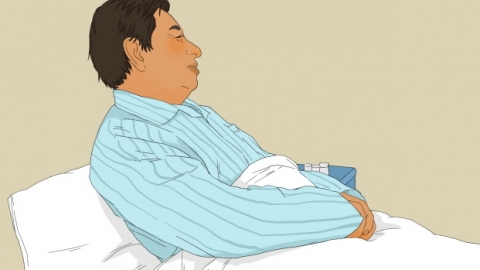How does mid-to-late stage liver cancer develop, and what should be done?
Generally, intermediate and advanced stages of liver cancer may be caused by unhealthy lifestyle habits, lack of health awareness, chronic hepatitis, hepatitis B viral infection, cirrhosis, and other factors. It is recommended to undergo symptomatic treatment under the guidance of a qualified physician, including general treatment and medication. Detailed explanations are as follows:

1. Unhealthy lifestyle habits
Long-term alcohol consumption, staying up late, and consuming greasy foods are unhealthy lifestyle habits that may damage the liver and increase the risk of developing liver cancer. These habits are common among the general population and difficult to change, contributing to the high incidence of intermediate and advanced liver cancer. Patients are advised to improve their lifestyle habits, avoid long-term excessive alcohol consumption, reduce late-night activities, manage their diet, and increase physical activity to protect liver health.
2. Lack of health awareness
Many individuals lack awareness of regular health check-ups and screening. Even when experiencing mild symptoms, they may neglect them or mistakenly attribute them to other diseases, delaying diagnosis and treatment. As a result, liver cancer is often already at an intermediate or advanced stage when detected. It is recommended to enhance health awareness and screening practices, and high-risk groups should strengthen early diagnosis and treatment for liver cancer.
3. Chronic hepatitis
Chronic hepatitis is mainly caused by viral infections, long-term alcohol abuse, drug-induced liver injury, and other factors. If not treated promptly, chronic hepatitis can lead to continuous liver damage and inflammatory responses, potentially progressing to cirrhosis and ultimately increasing the risk of intermediate and advanced liver cancer. Symptoms may include fatigue and yellowish complexion. Treatment under a physician's guidance may involve medications such as Amoxicillin Capsules, Cefixime Dispersible Tablets, and Compound Glycyrrhizin Tablets.
4. Hepatitis B viral infection
Hepatitis B viral infection is caused by the hepatitis B virus, which leads to liver inflammation. When the hepatitis B virus persists and actively replicates in the body, it can cause repeated liver damage and inflammatory responses, increasing the risk of liver cell carcinogenesis. Common symptoms include pain in the liver area, fatigue, and decreased appetite. Medications such as Lamivudine Tablets, Tacrolimus Sustained-Release Capsules, and Polyene Phosphatidylcholine Capsules may be used under medical guidance for treatment.
5. Cirrhosis
Cirrhosis is caused by long-term and repeated damage to the liver from one or multiple factors, leading to hepatocyte necrosis and liver fibrosis. In cirrhosis, the normal structure and function of the liver are severely impaired, making it prone to liver cell carcinogenesis and increasing the risk of intermediate and advanced liver cancer. Symptoms may include discomfort in the liver area, palmar erythema (liver palms), and spider angiomas. It is recommended to use medications such as Diammonium Glycyrrhizinate Capsules, Fuzheng Huayu Capsules, and Octreotide Acetate Injection under the guidance of a physician.
Patients with intermediate and advanced liver cancer should actively receive comprehensive treatment, including surgery, chemotherapy, targeted therapy, interventional therapy, and more. Meanwhile, they should enhance their health awareness, aiming for early detection and prompt treatment to reduce the incidence of intermediate and advanced liver cancer.






